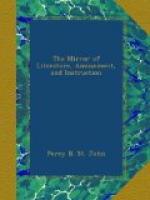Here misers may their bones inter
In shrouds of neat post-obit paper;
While, for their beirs, we’ve quicksilver,
That, fast as heart can wish, will caper.
For aldermen we’ve dials true,
That tell no hour but that of dinner;
For courtly parsons sermons new.
That suit alike both saint and sinner.
Who’ll buy? &c. &c.
No time we’ve now to name our
terms,
But whatsoe’er the whims that seize you.
This oldest of all mortal firms,
Folly and Co., will try to please you.
Or, should you wish a darker hue
Of goods that we can recommend you,
Why then—as we with lawyers do—
To Knavery’s shop next door we’ll
send you.
Who’ll buy? &c. &c.
* * * * *
SPIRIT OF THE PUBLIC JOURNALS.
* * * * *
PERCY BYSSHE SHELLEY AT OXFORD.
At the commencement of Michaelmas term, that is, at the end of October, in the year 1810, I happened one day to sit next to a fresh man at dinner: it was his first appearance in hall. His figure was slight, and his aspect remarkably youthful, even at our table, where all were very young. He seemed thoughtful and absent. He ate little, and seemed to have no acquaintance with any one. I know not how it was that we fell into conversation, for such familiarity was unusual, and, strange to say, much reserve prevailed in a society where there could not possibly be occasion for any. We have often endeavoured in vain to recollect in what manner our discourse began, and especially by what transition it passed to a subject sufficiently remote from all the associations we were able to trace. The stranger had expressed an enthusiastic admiration for poetical and imaginative works of the German school. I dissented from his criticisms. He upheld the originality of the German writings. I asserted their want of nature. “What modern literature,” said he, “will you compare to theirs?” I named the Italian. This roused all his impetuosity; and few, as I soon discovered, were more impetuous in argumentative conversation. So eager was our dispute, that when the servants came to clear the tables, we were not aware that we had been left alone. I remarked, that it was time to quit the hall, and I invited the stranger to finish the discussion at my rooms. He eagerly assented. He lost the thread of his discourse in the transit, and the whole of his enthusiasm in the cause of Germany; for as soon as he arrived at my rooms, and whilst I was lighting the candles, he said calmly, and to my great surprise, that he was not qualified to maintain such a discussion, for he was alike ignorant of Italian and German, and had only read the works of the Germans in translations, and but little of Italian poetry, even at second hand. For my part, I confessed, with an equal ingenuousness, that I knew nothing of German, and but little of Italian!




